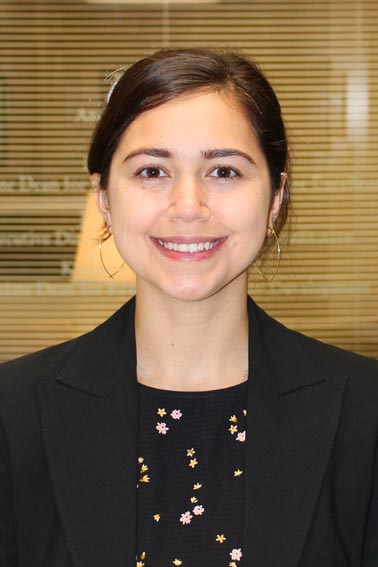Korinthia Nicolai: Impressed by SOE’s research emphasis
First-year doctoral student receives peer support from Holmes Scholars Program

Korinthia (Kori) Nicolai is a doctoral student in the VCU School of Education’s Ph.D. in Educational Psychology program. She is also a member of SOE’s Holmes Scholars Program, which provides mentorship, peer support and professional development opportunities to students from historically underrepresented groups who are pursuing careers in education. She graduated summa cum laude from James Madison University with a bachelor’s degree in psychology. She is originally from Warrenton, Virginia.
What drew you to the field of education?
Education touches the lives of most students, if not all. It is important to understand what is working in education and what isn’t, to help promote success for all students.
Is there anyone who inspired you to pursue study in this field?
My high school psychology teacher, Ms. Murphy, inspired me to pursue a degree in psychology. During my time at JMU, I had the opportunity to work on research projects with Dr. Jaime Kurtz and Dr. Krisztina Jakobsen. These experiences inspired me to utilize research to answer questions and help support students to succeed.
Why VCU SOE?
The context of Richmond is why I was interested in VCU. Further, the work of Dr. Zumbrunn, Dr. Koenka and Dr. Bae on self-regulation, motivation and cognition interested me in the Educational Psychology track at SOE.
What has impressed you most about your program so far?
The emphasis on research. In the Educational Psychology track, all students are part of research labs and many, including myself, have assistantships working with the faculty on research. Additionally, the climate in the Educational Psychology track is open and promotes growth.
What would be your dream job?
I would like to be a professor at an R1 university [institutions with numerous resources for research and many people conducting research] researching identity, motivation and belongingness for students belonging to underrepresented racial and ethnic groups. My dream project is to work with high school students and get them involved in research. Not only will this give high school students experience with research, it will also help to ensure we are measuring what we intended to and more fully capture the experiences of these students. They have the most insight into their context and experience.
Why the Holmes Scholars Program? “As a Latina, it provides the opportunity to receive peer support in navigating academia as a student from an underrepresented group.”
What do you do to relax and have fun outside of school?
I love spending time outside with my dogs or staying inside and crafting (thank you, Pinterest!).
Any tips for students who are considering study in your program at VCU SOE?
Get to know the faculty and students in the program, and make sure the program is a good fit for you. Additionally, look for faculty members who are doing research related to what you want to research; this way, you’ll gain experience in that field.
What drew you to the Holmes Scholars Program?
The opportunity to join a community of scholars at VCU who are highly motivated and productive with the common goal of working at a R1 university. Additionally, joining the Holmes Scholars Program was an opportunity to join a national network of scholars. Further, as a Latina, joining the community provides the opportunity to receive peer support in navigating academia as a student from an underrepresented group.
What have you enjoyed most about the Holmes Scholars Program so far?
As a first-year doc student, the Holmes Scholars Program has pushed me to seize opportunities and to be productive. It has helped me transition to a scholar in my first year, and the support from my fellow Holmes Scholars has helped me navigate being a Ph.D. student, as well as being a Ph.D. student who belongs to an underrepresented group.